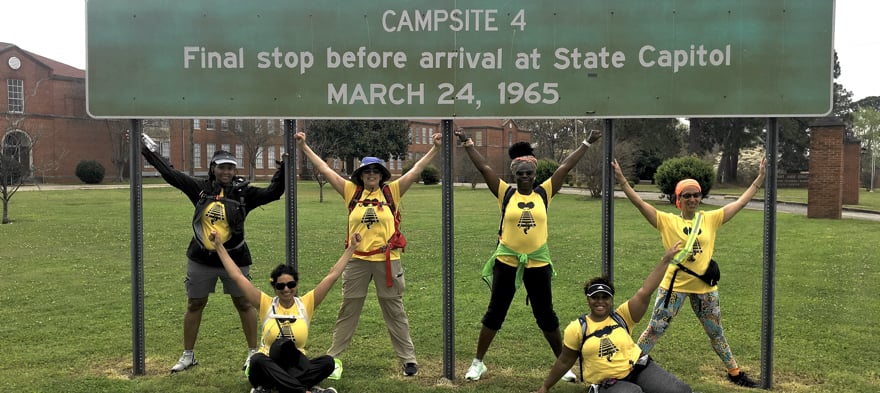
May 17, 2021 12:00:00 AM
It is hard to describe how it has felt to live in the skin I am in for the past two years. All I can share is that on the heels of the murder of George Floyd while in the midst of a global pandemic, I felt a deep need to answer a call.
[pullquote]How can I be a relentless advocate for education equity if I am not walking in the footsteps of my ancestors and parents who shed blood and risked their lives for me?[/pullquote]
In September 2020, I set out with seven Black women to walk the 116-miles in the steps of Harriet Tubman on the Underground Railroad Byway from Cambridge, Maryland, to Kennett Square, Pennsylvania to get as close as I possibly could to Harriet’s soul and spirit.
In March 2021, our group, the Daughters of the Underground, walked the 54-miles from Selma to Montgomery to commemorate the 56th anniversary to honor the lives lost and the victory won with the Voting Rights March. Sadly, the day we arrived at the Alabama state capitol is the same day that the state of Georgia passed an abhorrent set of racist voting laws.
As a police officer in Alabama said to us—IT IS STILL 1965.
The experiences walking through farmland and on the shoulders of highways in geographies where my people were lynched and beaten are too deep to fully express in a blog. [pullquote]I have emerged from these experiences a forever-changed Black woman warrior for educational equity[/pullquote], who is determined to honor their stories and lived experience by walking in their footsteps.
For me, walking in the footsteps of history has amplified the following:
It is impossible for me to reconcile my life with the risk, sacrifice and lost lives of my people. But there are two actions that I can take. I can honor my ancestors by continuing to physically walk the paths they took for justice and freedom and fiercely advocate for centering educational equity in the voices and experiences of disenfranchised students and families. And, in both cases, don’t stop until we have reached the promised land.
Learn more about the RISE UP Coalition and the Center for Inclusive Innovation.
Kimberly Smith is the executive director of the League of Innovative Schools and C enter for Inclusive Innovation at Digit al Promise. Previously, Kim was chief executive officer of the National Charter Collaborative,. She is an education executive with extensive experience in leading successful for- and nonprofit programs, businesses and services.
Few issues in education spark more tension and debate than standardized testing. Are they a tool for equity or a burden on students? A necessary check on school systems or a flawed measure of...
Charter schools are public schools with a purpose. Operating independently from traditional school districts, they're tuition-free, open to all students, and publicly funded—but with more flexibility...
Despite the benefits of a diverse teaching force, prospective teachers of color fall out of our leaky preparation pipeline at every stage: preparation, hiring, induction, and retention. Here’s what...
Ed Post is the flagship website platform of brightbeam, a 501(c3) network of education activists and influencers demanding a better education and a brighter future for every child.
© 2020-2025 brightbeam. All rights reserved.
Leave a Comment